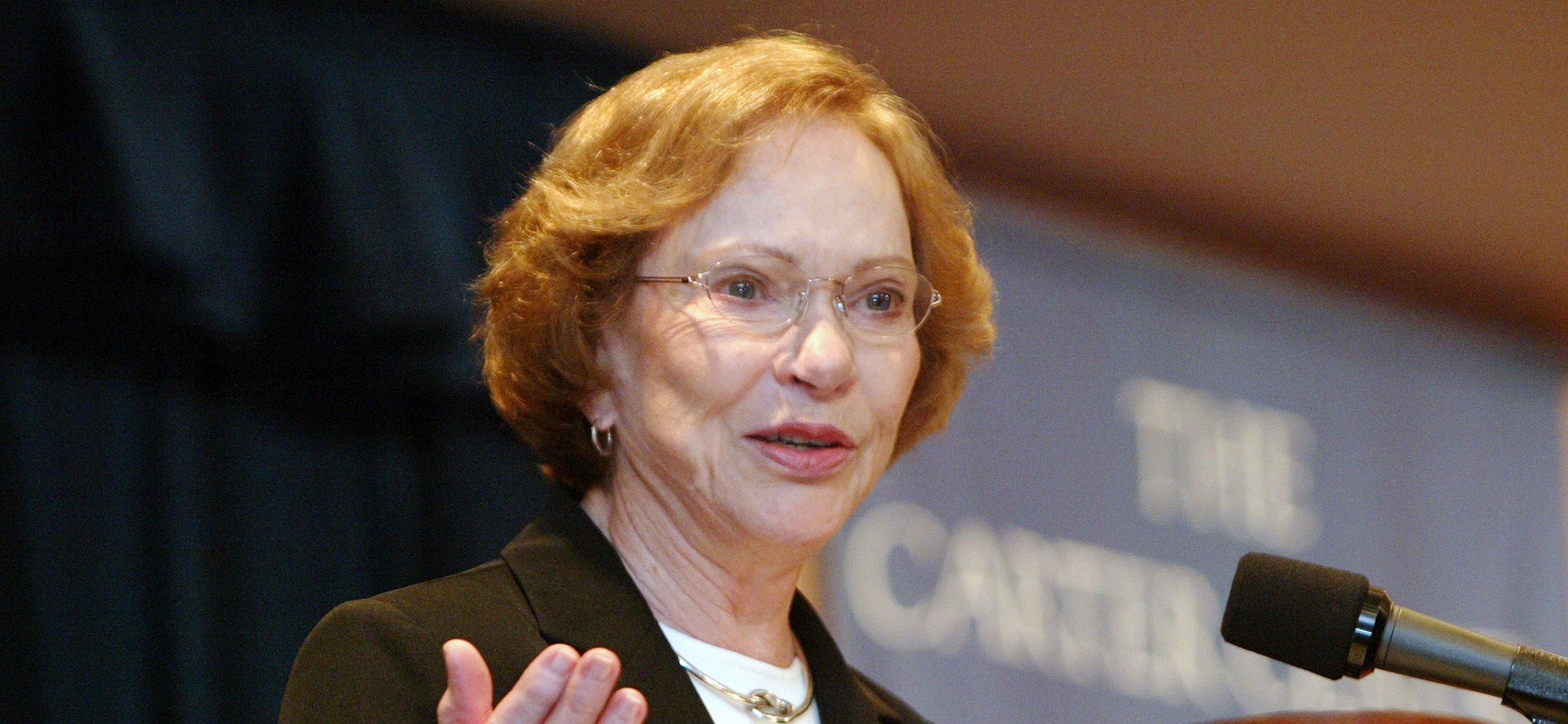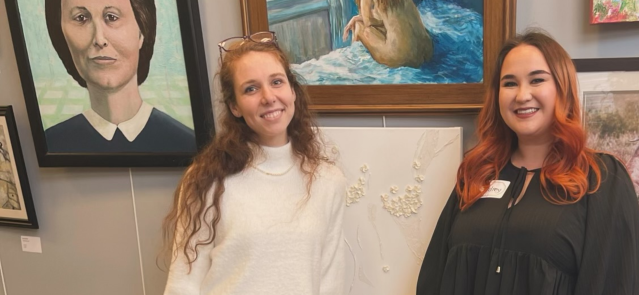Stay ahead of the curve as a political insider with deep policy analysis, daily briefings and policy-shaping tools.
Request a DemoRemembering Rosalynn Carter and her legacy of compassion and advocacy

Former First Lady Rosalynn Carter addresses participants in the 2006 Rosalynn Carter Symposium on Mental Health Policy at The Carter Center in Atlanta, Ga.Former First Lady Rosalynn Carter addresses participants in the 2006 Rosalynn Carter Symposium on Mental Health Policy at The Carter Center in Atlanta, Ga. (Credit: The Carter Center)
In the quiet town of Plains, Georgia, where the whispers of history blend with the rustling of peanut fields, a remarkable woman, Rosalynn Carter, left an indelible mark on the world. On Nov. 19, 2023, this extraordinary woman passed away at the age of 96, only two days after it was announced that she was entering home hospice care.
Carter, the wife of former President Jimmy Carter, leaves behind a legacy of compassion, advocacy, and a life dedicated to service.
Carter was born Rosalynn Smith (pronounced Rose-a-lynn, as any Georgian will tell you) on August 18, 1927, in Plains, a town she and her high school sweetheart would later put on the map as the hometown of a U.S. president.
As a young woman, Carter met the man who would become her partner in life, Jimmy Carter. The couple married on Sunday, July 7, 1946 in Plains. He was 21, she 18.
While they would embark on a journey that would first take them from the quiet streets of Plains to the bustling streets of Atlanta — where Jimmy would take his place as Georgia’s governor — to eventually the highest office in the land, it was not just the role of First Lady that defined Rosalynn Carter’s life; it was her unwavering commitment to making a difference in the lives of those less fortunate. That is what set her apart.
During her time as First Lady of the United States from 1977 to 1981, Carter focused her efforts on critical issues that often went unnoticed by the mainstream media. Her advocacy for mental health awareness was groundbreaking, as she tirelessly worked to destigmatize mental illness and promote access to mental health care for all Americans. Two of the five books she authored focused on the issue.
In addition to her mental health advocacy, she championed the rights of women and children, advocating for legislation such as the Equal Rights Amendment and the Child Nutrition Act. She used her platform to draw attention to issues that affected vulnerable communities, often challenging the status quo and pushing for change.
“I think there are certain issues where you have to take a stand. You can’t just worry about getting reelected,” Carter said in a 1979 interview with Time magazine. Her commitment to principle over politics made her a beacon of hope for many Americans who believed in the power of compassion and empathy.
And she urged others to reach their highest potential, to have faith in themselves. She famously said, “If you doubt you can accomplish something, then you can’t accomplish it. You have to have confidence in your ability, and then be tough enough to follow through.”
After leaving the White House, Rosalynn and Jimmy Carter continued their commitment to service through the Carter Center, a non-profit dedicated to advancing human rights and promoting democracy around the world. Carter played an integral role in the organization’s work, focusing on issues such as global health, conflict resolution, and election monitoring.
And her legacy extended far beyond American borders. Her work in promoting democracy and monitoring elections in troubled regions such as Sudan and Liberia demonstrated her unwavering commitment to human rights and the betterment of global society.
Throughout her life, Carter faced challenges and adversity with grace and resilience. Her marriage to Jimmy Carter weathered the storms of politics and public scrutiny, standing as a testament to the enduring power of love and partnership. Theirs was a partnership built on faith in God, mutual respect and shared values, a model of leadership that inspired many.
Carter’s life and legacy remind us of the power of empathy, compassion, and principled leadership. In an era often marked by divisiveness and discord, her example serves as a beacon, showing us that it is possible to make a positive impact on the world through kindness and determination.
As the people of Plains, Georgia, gather to mourn the loss of their beloved neighbor, the rest of the world joins them in celebrating the life of a remarkable woman who dedicated her life to making the world a better place. Carter’s legacy will live on in the hearts and minds of those who were touched by her compassion and inspired by her unwavering commitment to service.
In the quiet town of Plains, as the sun sets over the peanut fields, her legacy shines brightly, reminding us all that we can make a difference in the world, one small act of kindness at a time.
Alison Bethel is the chief content officer and editor-in-chief at State Affairs. If you have story ideas or suggestions, reach out to us at [email protected]. And sign up for our free newsletter so you do not miss an update.
Read more of our commentaries, tributes and stories on the Carters.
Twitter @STATEAFFAIRSGA
Facebook @StateAffairsGA
Instagram @STATEAFFAIRSGA
LinkedIn @STATEAFFAIRS
Know the most important news affecting Georgia
Get our free weekly newsletter that covers government, policy and politics that impact your everyday life—in 5 minutes or less.
Over 2.6M Georgians have already voted in next month’s election
CLAYTON, GA — Georgians this week continued their brisk pace to the polls with nearly 4 in 10 of the state’s active voters having cast ballots in person or by mail by late afternoon Friday. All told, over 2.6 million Georgians — or 36.2% — have cast ballots since early voting began Oct. 15, according …
Party on: Lt. Gov. Burt Jones rallies Republicans in the final stretch
You’ll have to forgive Burt Jones if he’s a bit tired. The state’s second-in-command has been keeping late hours in the final weeks leading to the Nov. 5 general election. The lieutenant governor spent most of Wednesday squiring Republican presidential candidate Donald Trump to a town hall in Zebulon and a gathering in Duluth that …
Madeline Ryan Smith keeps it local as she aims to unseat incumbent in Georgia House District 158
Editor’s note: State Affairs spoke with the four Gen Z candidates running for the state Legislature in November as part of our “On the CampaignTrail” series. They discussed their campaigns and what they plan to do if elected. This profile looks at Georgia House District 158 candidate Madeline Ryan Smith. To read the main story …
A primer on the Nov. 5 ballot measures: What you need to know
In addition to voting for president and down-ballot candidates in the Nov. 5 election, Georgians will decide on a couple of tax measures and whether to create a statewide tax court. Three questions call for a statewide vote, all of which appear at the end of the ballot. The first time most voters see these …




